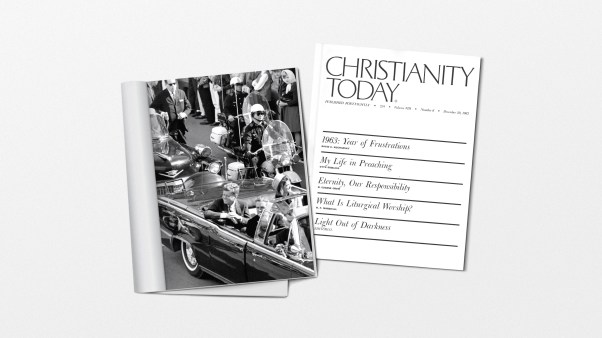The purple-tinted cover doesn’t appeal to me, and the title (The Habits of Highly Effective Churches) is offputting, with its echo of bestsellerdom, but no doubt they were market-tested, and who am I to argue with the research? “What Separates Good Churches from Great Ones?” the flap copy asks, and the answer is promptly supplied:
Real truth is always worth digging for—and usually eludes conventional wisdom and superficial statistics. That’s why George Barna is a bottom-line asset for your church.
More members aren’t the answer. Nor are more programs or a burgeoning bank balance. Backed by rock-solid, leading-edge research, Barna shows you how highly effective churches get that way—the principles and practices they share in common that set them apart.
Much of what follows is right, and sensible. “Demand accountability.” Yes. “Engage in strategic evangelism.” Yes again. “Serve the needy people in the community.” Emphatically, yes. That’s 100 percent Real Truth.
Still, some readers—most readers, in fact—will be looking for more details, more specifics, backed by that “rock-solid, leading-edge research.” I mean, you don’t need the BRG (the Barna Research Group, that is) to tell you to tie your shoes.
Barna knows this, of course, and he fleshes out those Really True principles with a load of BRG findings. We have discovered … I found … Our research shows … But even among readers who are entirely sympathetic with Barna’s goals—as I am—there will be at least a few impertinent enough to cock a skeptical brow at the Oracle.
Consider, for example, the chapter on “Facilitating Genuine Worship.” What does the Oracle tell us? “During the course of a worship service, most churches use music.” Hmmm. Let’s skip on a bit. “Pastors often make unwarranted assumptions about the capacity of the audience.” That looks more promising. For example,
The language used by the pastor is often more sophisticated than the congregation can understand. Our content analysis of sermons indicates that the typical sermon requires a 12th grade literacy level, yet the average church-goer has about an 8th grade literacy level.
So, get that sermon down to “an 8th grade literacy level.” Next.
The average sermon in Protestant churches today lasts 32 minutes. [You’re kidding! Somebody must be preaching a lot of hour-long sermons to bring up the average. What’s the median?] With the attention span of Americans constantly diminishing—our studies among Baby Busters, for instance, estimate their attention span in the 6- to 10-minute range—most sermons suffer from a “phasing” problem. People phase in and out of the sermon, catching some parts and missing others. … Techniques for enhancing content retention—intermittent visual aids, vocal pitch variation, staggered presentations and even shorter sermons—have been shown to heighten recall and impact.
That’s helpful. And I thought congregations—excuse me, audiences—actually preferred sermons delivered in a monotone. But then:
Some preachers are doomed from the start because they have not developed sufficient credibility in the minds of listeners. In this age of skepticism, establishing credibility is precursor to pedagogical impact.
Who could doubt it?
But the best (worst?) is yet to come. Barna is evidently sensitive to the possibility that some critics may charge him with selling a Method that fails to acknowledge the work of the Holy Spirit in worship. And so we come to these astonishing sentences: “One of the more unique [as opposed to less unique?] aspects of worship services at highly effective churches is that one never knows exactly how long they will last. This is not for lack of planning or due to unprofessionalism; it is because of sensitivity to the Holy Spirit.”
It is also, to put it insensitively, a crock. In my lifetime experience of good and bad churches, highly effective and highly ineffective churches alike, one thing you can count on is that most of the time, everyone participating in worship knows when the service will end. Down to the very minute? No. Without exception? No. But most of time, overwhelmingly so? Yes. If Barna has a shred of evidence to the contrary—showing how “highly effective” churches deviate significantly from this norm—let him produce it.
In its article on the showman and circus proprietor P.T. Barnum, the Encyclopaedia Britannica says of Barnum that, “Although considered the father of modern publicity practices and the reputed author of statements like ‘There’s a sucker born every minute,’ this impresario drew a sharp, if somewhat personal line between fraud and innocent humbug.” With Barna, it should go without saying, there is no question of fraud. The man has a passion for the gospel and for the church. His motivation and his integrity are impeccable. But humbug? You be the judge.
John Wilson is Editor of Books & Culture: A Christian Review.
Related Elsewhere
Visit Books & Culture online at BooksandCulture.com or subscribe here.
If you’re still interested in Barna’s The Habits of Highly Effective Churches, it is available for purchase at the Christianity Online bookstore.
Barna’s research, press releases, and other resources are available at Barna Research Online.
Books & Culture Corner appears Mondays at ChristianityToday.com. Earlier Books & Culture Corners include:
Peacemaking in Northern Ireland | Former U.S. Senator George Mitchell considers the long, often painful process. By Mary Cagney (May 15, 2000) Our Bodies, Our Selves? | Facing the discomfort we have with our physiques. By John Wilson (May 8, 2000) True West | Three excellent museum shows—not to mention our magazines—reexamine the American frontier. By John Wilson (May 1, 2000) Defending Faith and Learning | Baylor University’s Polanyi Center comes under fire from the university’s faculty. By John Wilson (Apr. 24, 2000) Lie Is Beautiful | Dante understood irony’s use as a weapon against intellectual arrogance. By Andrew Jones (Apr. 17, 2000) Who in Hell? | Theologian John Sanders considers the eternal fate of non-Christians. By John Wilson (Apr. 10, 2000) My Cab Ride With Gloria | Meeting a legend, tearfully. By Frederica Mathewes-Green (Apr. 3, 2000) I Read the News Today | Finding the most important story in headlines’ sum. By John Wilson (Mar. 27, 2000) Peace Be With You | Looking beyond naivete and cynicism about peacemaking at Wheaton’s Christianity and Violence conference (Mar. 20, 2000)
Copyright © 2000 Christianity Today. Click for reprint information.








